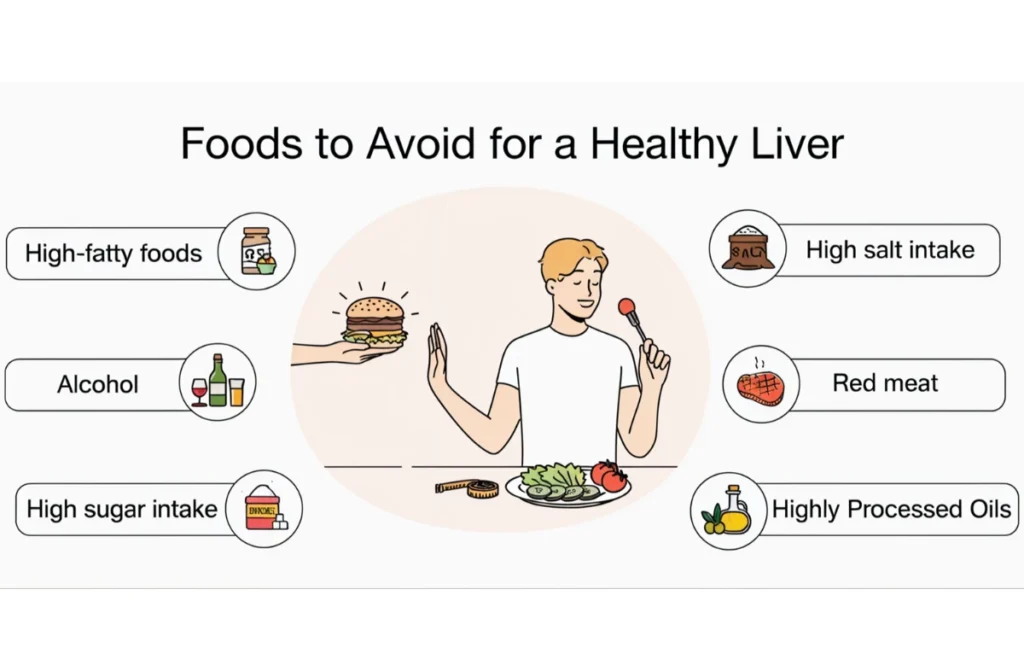The liver is one of the most important organs in your body. It processes nutrients, removes toxins, and supports digestion. But when it gets damaged over time, liver cirrhosis can develop. Learning how to prevent liver cirrhosis is key to maintaining good health.
Cirrhosis happens when scar tissue replaces healthy liver cells. This can result from long-term alcohol use, hepatitis infections, or fatty liver disease. Knowing how to avoid cirrhosis, how to avoid liver failure, and how to prevent cirrhosis from getting worse can help you take the right steps to keep your liver healthy.
In this blog, we’ll explore what cirrhosis is, its symptoms, and what causes it. You’ll also learn how to reduce risk factors and when to see a doctor. By following these tips, you can improve your liver health and how to avoid cirrhosis complications.

What is Cirrhosis of the Liver?
Cirrhosis of the liver is a condition where healthy liver tissue is gradually replaced with scar tissue. This happens when the liver suffers repeated damage and cannot repair itself properly. Over time, the scarring affects the liver’s ability to function.
Cirrhosis can develop from conditions like long-term alcohol abuse, chronic hepatitis B or C, and fatty liver disease. It usually progresses slowly, so you may not notice symptoms early. But as the disease worsens, how to avoid liver failure or cancer can occur.
Preventing liver damage is the best way to stop cirrhosis from happening. Understanding how to prevent liver cirrhosis by addressing its causes and managing your health can make a big difference.
Symptoms and Causes
Cirrhosis can show up in different ways depending on how advanced it is.
- Early Symptoms:
- Fatigue
- Weakness
- Nausea
- Loss of appetite
- Unexplained weight loss
- Later Symptoms:
- Jaundice (yellowing of the skin or eyes)
- Swelling in the abdomen or legs
- Bruising or bleeding easily
- Confusion or forgetfulness (due to toxin buildup)
What are the First Signs of Cirrhosis of the Liver?
The first signs are often mild and can include fatigue, a reduced appetite, and slight weight loss. These symptoms are easy to ignore but should be checked if you’re at risk of liver disease.
What are Symptoms of Advancing Cirrhosis?
In advanced stages, symptoms worsen and include:
- Jaundice
- Fluid buildup in the abdomen (ascites)
- Mental confusion or drowsiness (hepatic encephalopathy)
What Causes Cirrhosis of the Liver?
Cirrhosis is caused by repeated damage to liver cells. Common causes include:
- Long-term alcohol abuse
- Chronic hepatitis B or C infections
- Non-alcoholic fatty liver disease
By addressing these factors, you can learn how to prevent cirrhosis from getting worse.
Risk Factors
Some factors increase the risk of cirrhosis:
- Drinking excessive alcohol over time
- Contracting hepatitis B or C infections
- Being overweight or having diabetes
- Family history of liver disease
- Taking medications that damage the liver
Taking steps like avoiding alcohol, managing your weight, and getting vaccinated for hepatitis can significantly reduce your risk. Understanding how to prevent liver cirrhosis involves making small but important lifestyle changes.
Complications
Cirrhosis can lead to severe health problems, including:
- Liver failure
- Liver cancer
- Internal bleeding
- Kidney damage
- Infections such as peritonitis
Early prevention is key to avoiding these life-threatening complications.
How to Prevent Liver Cirrhosis
Here’s how to prevent liver cirrhosis and protect your liver:
- Limit or stop alcohol use.
- Eat a balanced diet with fruits, vegetables, and lean protein.
- Exercise regularly to manage your weight.
- Get vaccinated for hepatitis B.
- Practice safe behaviors to avoid hepatitis C.
- Avoid self-medicating or overusing medications.
By making these choices, you’ll learn how to prevent liver cirrhosis and keep your liver functioning well.
When to See a Doctor
Visit a doctor if you experience:
- Persistent fatigue
- Jaundice
- Swelling in your abdomen or legs
- Confusion or memory issues
Early diagnosis can help manage cirrhosis and prevent further damage.
Diagnosing Cirrhosis
Doctors diagnose cirrhosis through:
- Blood tests to check liver enzymes and functions
- Imaging tests like ultrasounds or MRIs to see liver damage
- A biopsy to confirm scarring
Early diagnosis is essential for learning how to prevent liver cirrhosis from progressing.
Treating Cirrhosis
Treatment focuses on managing symptoms and slowing damage:
- Medications for hepatitis or swelling
- Lifestyle changes like avoiding alcohol
- Regular monitoring for complications
In severe cases, a liver transplant may be necessary. Addressing risk factors early is the best way to protect your liver.
Conclusion
Knowing how to prevent liver cirrhosis is critical for maintaining good health. Avoiding alcohol, managing weight, and getting vaccinated for hepatitis are effective ways to reduce risks. If you notice symptoms, seek medical advice to stop cirrhosis from getting worse. Protect your liver today to avoid complications like liver failure in the future.
